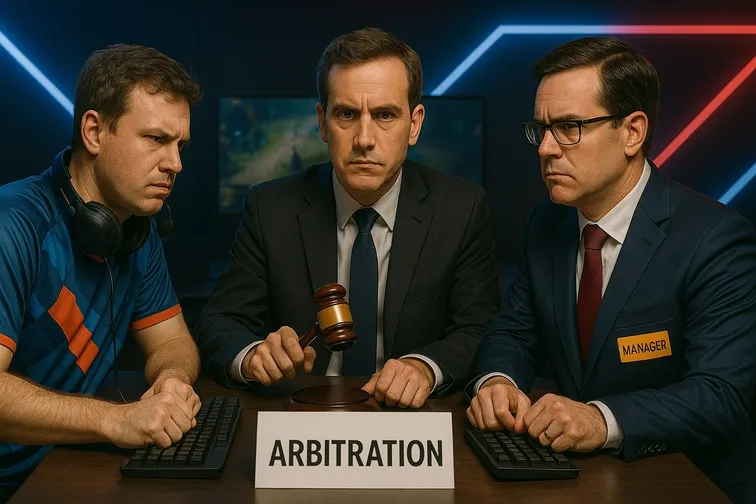When a major scandal regarding the abuse of the coaching bug in Counter-Strike: Global Offensive came to light in 2020, the e-sports industry faced the most significant ethical issue in its history. Coaches of dozens of teams exploited a game bug that, during matches, allowed them to track opponents or see parts of the game map that they would otherwise not see. Following an investigation by the Esports Integrity Commission (ESIC), more than 30 professional e-sports coaches were sanctioned – without the chance to present their arguments – with bans ranging from months to years.
The event triggered extensive discussions on how to fairly and effectively resolve e-sports disputes and how to ensure fairness both in the game and outside of it – in contractual relationships and ethical disputes.
The e-sports world started to call for an element familiar in the traditional sports environment – arbitration – a mechanism that would allow for a swift, professional and legally binding resolution of disputes outside the traditional judicial proceedings.
Arbitration? Arbitration!
Arbitration is a form of alternative dispute resolution. In an arbitration clause included in their contract, or in an arbitrator agreement made after a conflict emerged, the parties agree that their argument will be resolved not by a court, but by an independent and impartial arbitrator.
This rules out the jurisdiction of traditional courts, and the dispute is resolved under private law. While arbitration already has a firm place in sports law, in the e-sports industry, which requires both speed and expertise, the notion to use arbitration is becoming increasingly prominent.
Why does arbitration make sense in e-sports?
As opposed to traditional judicial proceedings, arbitration has several major advantages:
- Speed: E-sports careers are often short, often lasting only a few years, and their peak is even shorter. An extended legal dispute with a player’s club can have a devastating effect on the player’s career. Unless the parties agree otherwise, arbitration is usually a single-stage process with one oral hearing, which makes it a faster dispute resolution alternative. The parties retain control, for example, over the time limits for their written pleadings. This also contributes to the efficiency of the arbitration process.
- Specialisation of arbitrators: An arbitrator does not have to be a lawyer. The arbitrator can be, for example, an e-sports expert such as a tournament organiser or a member of an e-sports association. Even without a legal background, such an arbitrator is often more competent to decide a dispute, because compared to ie. judges in Czechia’s smaller district courts, it will be easier to explain to the arbitrator that player XY used unauthorised gaming software.
- Flexibility: The parties may agree to have their dispute resolved online or, for instance, based on written statements only.
- Low costs: As many arbitration courts have pre-defined costs structure, so the parties are aware ie. of their handling and arbitrator fees resulting from the arbitration in advance. The overall swiftness of the procedure can help the parties to reduce their legal costs, which can amount, in prolonged civil lawsuits, from tens to hundreds of thousands of CZK.
- Confidentiality: Disputes subject to arbitration are generally not public and strictly confidential, protecting the reputation of teams, players, and business partners.
- International recognition: Under the 1958 New York Convention, arbitral awards are recognised in most countries worldwide. The parties do not have to worry that the outcome of their arbitration will not have international implications.
Historical attempts at e-sports arbitration
One of the first attempts at institutional arbitration in e-sports was the 2016 WESA Arbitration, established by the World E-Sports Association. Although WESA members included major e-sports names, the arbitration never became established in the e-sports ecosystem.
Critics pointed to a conflict of interest – the creators of the arbitration often coincided with tournament organisers and owners of the largest e-sports teams. This raised doubts about the impartiality and independence of the decision-making. Non-transparent rules were also criticised by the legal public.
Riot Games Dispute Resolution for EMEA: a new standard?
However, 2024 saw a major breakthrough. Riot Games, a publisher of games such as League of Legends and Valorant, launched its own institutional arbitration mechanism called Dispute Resolution for Riot Games' Esports EMEA (“DR EMEA”).
This system:
- introduces the arbitration trend to professional and semi-professional teams in the Europe, Middle East and Africa region, allowing them to efficiently resolve disputes between players, teams, and coaches exclusively in game titles published by Riot Games;
- includes more than 1,500 players, 200 teams, and 400 coaches;
- allows arbitration based on an arbitration clause or on an ad hoc agreement after the dispute has arisen;
- uses a professional arbitration pool composed of 14 arbitrators with e-sports or classic sports experience;
- operates with a predictable fee schedule – administrative fees per application filed range from €500 to €4.000, and arbitrator’s fees between €1.000 to €5.000;
- supports low-income parties through the Legal Aid Fund, which aims to provide financial aid to litigants who are unable to bear the financial cost of the fees mentioned above;
- decides in most cases only based on written pleadings without an oral hearing;
- applies the principle ex aequo et bono – the arbitrator’s decision is guided by equity and good morals, not exclusively by written law.
DR EMEA is a significant step forward for e-sports arbitration and a very important initiative by game developers to regulate their own e-sports market. The aim is to actively protect its participants by creating mechanisms that enable individual stakeholders to effectively assert and defend their rights and assets.
Institutionalised and well-functioning arbitration can be an effective advantage for e-sports investors. When deciding whether to invest in e-sports, potential investors may ask a relevant question whether their investment can be protected in a legally binding manner.
Relevance for the Czech and Central European market?
It will be interesting to see whether DR EMEA will be used effectively within the Czech and Central European market. We believe that in this respect, how the Legal Aid fund is used in practice will play an important role.
In an effort to further protect players, clubs, and coaches, we can assume that Riot Games will use the Legal Aid Fund to help enforce DR EMEA in regions where traditional protection of contractual rights can be costly.
Another question may be whether it is time arbitration bodies to also be established for other game titles. For example, tournament organisers could use arbitration for contractual disputes in VALVE titles such as Counter Strike 2 or DotA 2. This would prevent situations where players suddenly stop playing for their team, or teams stop paying players overnight.
Traditional judicial path for such disputes is not efficient and in principle not worth it. On the other hand, arbitration in these legal disputes can be a way to professionalise and institutionalise the industry, contributing to more stability and predictability of the e-sports environment.
Are you dealing with a e-sports dispute or trying to regulate your local e-sports market? Email us at office@havelpartners.cz.








